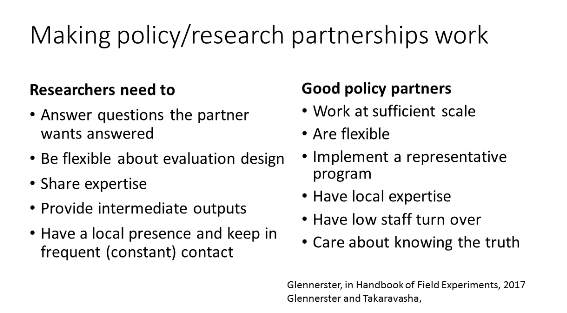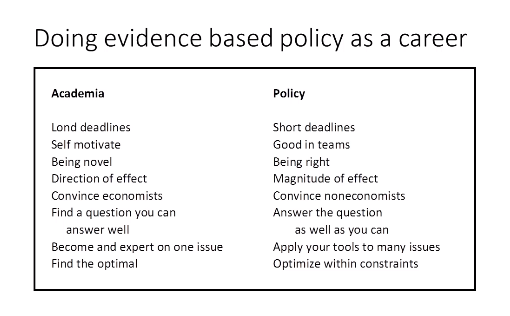Guest post by Jeff Mosenkis of Innovations for Poverty Action. Above: Some lessons from Rachel Glennerster on policy vs. academic research paths Nick Kristof talks with Amanda Glassman at the Center for Global Development about trying to get the world’s attention to alleviation of poverty and suffering. (FYI there are a number of tools that will let you covert youtube videos to audio MP3 to listen to like podcasts). A nice pair of short podcasts with Alice Evans and David Evans (who are unrelated but apparently share the massive enthusiasm gene). The first is on the World Development Report and what we know about education, and the second on how one uses RCTs to test an idea. David brings up an important nuance in the difference between an efficacy (does the program work at all under
Topics:
Jeff Mosenkis (IPA) considers the following as important: comparative politics, Crime, development, domestic violence, DRC, Economics, links, madagascar, miscellany, news, policy, political science, Research, resource curse
This could be interesting, too:
Lars Pålsson Syll writes Schuldenbremse bye bye
Lars Pålsson Syll writes What’s wrong with economics — a primer
Lars Pålsson Syll writes Krigskeynesianismens återkomst
Lars Pålsson Syll writes Finding Eigenvalues and Eigenvectors (student stuff)
Guest post by Jeff Mosenkis of Innovations for Poverty Action.


Above: Some lessons from Rachel Glennerster on policy vs. academic research paths
- Nick Kristof talks with Amanda Glassman at the Center for Global Development about trying to get the world’s attention to alleviation of poverty and suffering. (FYI there are a number of tools that will let you covert youtube videos to audio MP3 to listen to like podcasts).
- A nice pair of short podcasts with Alice Evans and David Evans (who are unrelated but apparently share the massive enthusiasm gene). The first is on the World Development Report and what we know about education, and the second on how one uses RCTs to test an idea. David brings up an important nuance in the difference between an efficacy (does the program work at all under ideal conditions?), vs effectiveness (does it work as implemented in the practical world?) trials, and how one’s inferences from each might differ. (Apple podcasts).
- The slides above are from a very good talk Rachel Glennerster gave at the Oxford Centre for the Study of African Economies conference about how to do policy work from an economics perspective, and the difference between academic and policy uses of the economist’s toolkit.
- She gave a several nice examples of how to think about abstracting the mechanisms behind particular findings to general principles, using vaccines as an example. Unvaccinated kids: If families never start vaccines, the problem might be access (look at price or other barriers). If they start their series of scheduled vaccines but don’t complete them, a social/behavioral solution like incentives or other nudge might be appropriate.
- Agenda here (scroll down for the descriptions), videos here, and a roundup on Dev Impact Blog, by Goldstein and Evans, summarizing a ton of papers in single bullet points with links (114 by my count), sorted by sector.
- It’s hard to escape the irony of a bunch of Americans (and others) flying to England to talk about African economies, but the Centre does have a two-month fellowship for scholars from any African country.
- The majority of $4 billion of U.S. philanthropic grants made to African universities between 2003 and 2013 went to institutions in English-speaking countries (h/t John Branch). But even politically minded academics aren’t immune to this bias – over 20 years the majority of published papers in two journals specifically about African politics focus on politics of English-speaking countries.
- Two really interesting articles via Rachel Strohm:
Going back to Rachel’s and David’s point on types of RCTs, it’s important to remember that even though we use the same language to talk about outcomes (“vaccination rates”) or inputs (“vocational training”), that doesn’t mean they’re actually identical.


